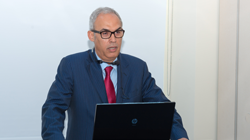

Bahrain Central Bank’s Governor, His Excellency Rasheed Al-Mearaj, has emphasized the importance of creating capable Bahraini leaders to guide the economic development process in the Kingdom of Bahrain in a manner commensurate with the financial and economic policies worldwide. He also emphasized the necessity for developing a second line of leaders in the Government sector to be on standby when leadership responsibilities are transferred to them. He pointed out that contribution to addressing economic situations is a joint responsibility between the public and private sectors. “Such efforts must be shared by all community sectors”, he said. This came in a presentation organized by the Bahrain Institute of Public Administration (BIPA) under the theme of “Financial Situations: Facts and Challenges”. The event was conducted by Dr. Ahmed Al-Balooshi, former Financial Controller at the National Audit Court, in the presence of a number of public sector Undersecretaries, Assistant Undersecretaries and Directors.
Almearaj highlighted the importance of working to develop the local economy to be able to compete and adopt best practices in various aspects of economic activities. “Efforts should be directed at increasing contribution of the local work force to all economic sectors to accumulate expertise and skills that can cope with the ongoing change in the business environment and to instill concepts, behaviours and values of work to increase productivity and accumulate knowledge”, Almearaj said. He briefly explained public debt and credit rating in the Kingdom of Bahrain and the risks associated with continuous deficits and means of financing such deficits in the State Public Budget.
On his part, His Excellency Dr. Raed Mohammed Bin Shams, Director of the Bahrain Institute of Public Administration (BIPA) said that BIPA endeavours to build up a knowledge-based economy that adopts best practices in terms of administration to contribute to achieving sustained development in various areas. “BIPA’s tripartite strategy endeavours to create leaderships capable of enhancing management concepts, practices and behaviours that will support optimal management of resources, generating policies to support development processes and spread culture of ongoing change and innovation, and focusing on improved services to keep abreast of developmental aspirations”, he explained.
Dr. Bin Shams emphasized that BIPA seeks to develop human capital as the principal drive to address risks associated with instability of economic and financial situations. “BIPA is also keen to educate the financial and economic cultures to all civil servants in the form of leadership and specialized program modules” he said. “BIPA provides programs in response to Government sector requirements”, he added. Dr. Bin Shams announced that BIPA would shortly introduce general financial programs in cooperation with the Ministry of Finance to meet financial sector staff members’ requirements.
In conclusion, Dr. Bin Shams thanked Mr. Almearaj, Governor of the Central Bank of Bahrain, for the useful information he provided on finance and on the national economy of the Kingdom of Bahrain. “Such meetings and workshops will certainly enhance the efforts exerted in evolving the future development in Bahrain, and that the exchange of ideas over such important issues will define innovative development tracks for making strategic and proper decisions for the development process in Bahrain.
